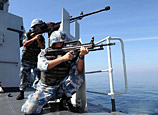
ROME, March 12 (Xinhua) -- Italy said Tuesday it would not send two Italian marines charged with murder back to India to face trials, sparking an international outcry likely to severely strain relations between the two countries.
Italian marines Massimiliano Latorre and Salvatore Girone, who were stationed on the oil tanker MV Enrica Lexie, are charged with shooting and killing two unarmed Indian fishermen off the coast of the Indian state of Kerala.
The sailors say they thought the men were pirates. Italy reached a financial settlement with the families of the two men, but India said it wanted to try the men in its courts.
That stance caused a momentary standoff last year, that was at least partially defused when the Indian Supreme Court voted to allow the marines to return to Italy in order to vote in the country's Feb. 24-25 elections and to spend time with their families, but only on the condition -- reportedly guaranteed by the Italian government -- that they return to India after four weeks.
But on Tuesday, the Italian government said they would not send the soldiers back, saying they will stand trial in Italy instead. Italian officials said India is seeking to violate international law by putting the two men on trial in India, given that the alleged shooting took place in international waters.
The statement from Italy's Ministry of Foreign Affairs said that India failed to respond to Italian requests seeking a "diplomatic solution" to the problem.
The end result is a formal diplomatic dispute between the two countries under the United Nations Convention of the Law of the Sea.
Indian Prime Minister Manmohan Singh called the situation "unacceptable," while the Indian Ministry of Foreign Affairs summoned Italy's ambassador Daniele Mancini to explain what India said was an unexpected about-face from the Italian government.
The story was the top one on Indian news sites and television news programs. Angry Indian political leaders of all stripes spoke out against the apparent change in the Italian position, calling for the government to pressure Italy to return the two sailors -- called "fugitives" in the Indian press -- and threatening to try them "in absentia" (without their presence) in the Indian courts.
Many leaders referred to the Italian announcement as a high-stakes "betrayal."
In Italy, the response was more muted, with other story lines dominating the press. But the coverage that did emerge was mostly patriotic in nature, and standing behind the government's claim that as an international incident, the Indian courts had no jurisdiction.
It is the second high profile row between India and Italy in recent weeks: last month, India suspended a 750-million-U.S. dollar helicopter order with Italian aerospace and defense company Finmeccanica after the company's CEO Giuseppe Orsi was arrested on charges of bribery.
Finmeccanica promised to cooperate with Indian officials to clear up the issue, and the 12-helicopter order is still pending. But as complicated as that situation appears to be, all indications are that the fate of Latorre and Girone will be even harder to resolve to everyone's satisfaction.
















 Spring Style: Temperatures rise in south China cities
Spring Style: Temperatures rise in south China cities


![]()
